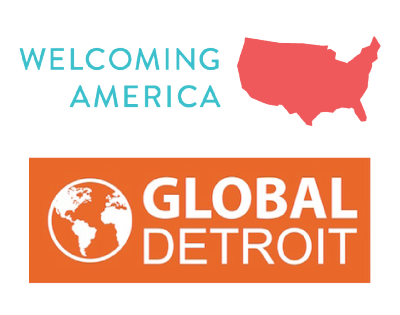Sharing Immigrant Economic Development Expertise from Across the Region
Many people learn most successfully through interaction and discussion of problems and solutions with peers, rather than simply reading a research paper or engaging in self-reflection. That’s what made the Getting started in Immigrant Economic Development: Sharing Immigrant Economic Development Experiences from Across the Region panel at the recent WE Global Network 3rd Annual Convening in Dayton so beneficial; it was a discussion, an active learning experience made effective by the experience and knowledge of its attendees.
Celebrating the release of Welcoming America’s Guide to Immigrant Economic Development, a publication dedicated to helping local economic development practitioners, local government, immigrant welcoming partners, refugee resettlement agencies, and others implement and hone immigrant economic development programs, the Getting Started panel explored ways in which organizations can bring an economic lens to integration efforts. Facilitated by WE Global Leadership Team members Susan Downs-Karkos, Director of Strategic Partnership, Welcoming America, and Steve Tobocman, Director, Global Detroit, the panel focused on four important chapters from the guide – Homeownership, Entrepreneurship, Highly Skilled Workers, and Workforce – with a roundtable discussion for each. Attendees spent 15-20 minutes discussing each topic with peers.
This local perspectives is what made the panel so valuable. A facilitator was present to stimulate conversation, but each discussion was steered by those who sat at the designated tables for each topic. The outcome and nature of those discussions were fully determined by the participants and conversation could flow in any direction.
One conversation at the Entrepreneurship table focused on the difficulties of refugee entrepreneurs; how can economic advice be provided to struggling refugees when entrepreneurship service providers don’t fully appreciate the plight of those they wish to serve? Cultural and personal understanding must be achieved before progress can be made the table’s participants agreed. Another group discussed the feasibility of entrepreneurial mentoring between immigrants. What reason, beyond compassion, would an immigrant business owner have to help a potential competitor get going?
These were but a few of the discussions that came from the roundtables. Interesting and worthwhile questions were asked, and while there was not time to create solutions for all of them, progress was made. Just as valuable are the connections made among peers; business cards were swapped, and Convening attendees fostered relationships with others navigating the same waters. Attendees were tapping into one of their most valuable resources: their peers.
The Getting Started panel and Guide provide practitioners new to the field a framework for lasting work in immigrant economic development. The relationships sparked will be built upon and open avenues for attendees’ continued exchange of effective practices. The panel could end up being as much as a meeting between future partners; and at the very least, it was fun and informative. The WE Global Network Convening was fortunate enough to have 15 interesting, engaging, and informative panels, and it is discussions like those in the Getting Started panel that help foster a collaborative environment for immigrant economic development work to grow.



